- The Institute
- Research
- Dictatorships in the 20th Century
- Democracies and their Historical Self-Perceptions
- Transformations in Most Recent History
- International and Transnational Relations
- Edited Source Collections
- Dissertation Projects
- Completed Projects
- Dokumentation Obersalzberg
- Center for Holocaust Studies
- Berlin Center for Cold War Studies
- Publications
- Vierteljahrshefte
- The Archives
- Library
- Center for Holocaust Studies
- News
- Dates
- Press
- Recent Publications
- News from the Institute
- Topics
- Reordering Yugoslavia, Rethinking Europe
- Munich 1972
- Confronting Decline
- Digital Contemporary History
- Transportation in Germany
- German Federal Chancellery
- Democratic Culture and the Nazi Past
- The History of the Treuhandanstalt
- Foreign Policy Documentation (AAPD)
- Dokumentation Obersalzberg
- Hitler, Mein Kampf. A Critical Edition
- "Man hört, man spricht"
- IfZ
- The Institute
- About the Institute
- International Cooperation
- About the Institute
- Our Profile
- History
- Boards
- Organization Chart
- Leibniz Association
- Annual Reports
- International Cooperation
- Equal Opportunities
- Social Commitment
- Literature about the IfZ
- Locations
- Press
- User Information
- Staff
- Visiting Fellows
- Positions/Internships
- Past Events
- Expertise
- Lectures and Courses
- Promoting Young Researchers
- Open-Access
International Cooperation
Academic research and discourse are international in orientation. The Leibniz Institute for Contemporary History cooperates regularly with numerous European and non-European institutions and partners to promote the exchange of academic ideas, to develop joint research projects, to advance these projects, and to disseminate the results around the world. The most important examples of international cooperation at the IfZ are briefly outlined in the following.
Center for Holocaust Studies
Established at the Leibniz Institute for Contemporary History in 2013, the Center for Holocaust Studies is strongly global in orientation, working in international cooperation on research and publication projects and organizing annual international conferences. The Center for Holocaust Studies is also a key partner in the European Union’s European Holocaust Research Infrastructure (EHRI) project (see below).
The Center for Holocaust Studies runs various scholarship programs, providing researchers from all over the world access to its excellent infrastructure. The IfZ has been cooperating with the Center for Advanced Holocaust Studies of the United States Holocaust Memorial Museum (USHMM) in Washington D.C. since 2011. Each year, one American and one German researcher are each given the opportunity to spend time in the other country within the framework of a joint fellowship program. In addition to short-term fellowships within the EHRI project, the Center offers general fellowships each year for research stays in Munich of up to four months.
You can find further information at the Center for Holocaust Studies website.
Further information on the fellowship programs and current calls for applications can be found here.
European Holocaust Research Infrastructure (EHRI)
The Center for Holocaust Studies at the IfZ works together with 23 other research institutions from 15 European countries, Israel, and the United States on the European Holocaust Research Infrastructure (EHRI) project. Funded by the European Union, the project aims to support, on a long-term basis, the networking of research and archive resources on the history of the Holocaust. The Center is one of the main partners leading and organizing the project together with the NIOD Institute for War, Holocaust and Genocide Studies (Amsterdam), Yad Vashem (Jerusalem), the Centre for Historical Research and Documentation on War and Contemporary Society (CEGESOMA, Brussels), King’s College (London), the Jewish Museum in Prague, and Data Archiving and Networked Services (DANS, The Hague). The intensive cooperation on the Project Management Board and within the individual “work packages”, in which the Center for Holocaust Studies is involved or for which it is responsible, involves participation at regular meetings, workshops, and virtual conferences. This in turn fosters the institute’s international integration as well as the EHRI Fellowship program and EHRI Seminars, which enable numerous young researchers from abroad to work in Munich as well as many other destinations for a few weeks. The IfZ was involved in the EHRI project from the very beginning, playing a decisive role in the development of a European infrastructure in one of the most important international areas of research.
Further information can be found at the websites of the Center for Holocaust Studies and of the EHRI project.
German Yearbook of Contemporary History
The German Yearbook of Contemporary History, published for the first time in 2016, represents an important step towards expanding the Leibniz Institute for Contemporary History’s network, especially within the English-speaking scholarly world. In cooperation with the De Gruyter Oldenbourg publishing house, the IfZ has thus launched a new journal specifically tailored to the British and North American markets. The journal combines translated articles from the renowned journal Vierteljahrshefte für Zeitgeschichte and newly commissioned articles which deal with past research in a discursive fashion. The aim of this innovative project is to promote the visibility of German research in contemporary history and to make research results accessible to a broader audience . The annual thematic volumes are each entrusted to a team of editors, which usually includes a member of the editorial staff of Vierteljahrshefte für Zeitgeschichte and a historian from the English-speaking world.
Further information on the German Yearbook of Contemporary History can be found at the website Vierteljahrshefte für Zeitgeschichte website.
International Editors Network
Since its foundation, the editorial group at Akten zur Auswärtigen Politik der Bundesrepublik Deutschland (AAPD – Foreign Policy Documents of the Federal Republic of Germany) has been part of a network of research teams working on the publication of the diplomatic documents of other states and organizations, and has been regularly represented at the international editors’ conferences held every two years. This International Network of Editors of Diplomatic Documents brings together institutions and organizations working on documents relating to states in Europe, North and South America, Asia, and Australia, as well as the European Union and the United Nations. The International Committee of Editors of Diplomatic Documents (ICEDD) was founded in 2013 as an association of editors committed to high academic standards. The IfZ is represented on the six-member ICEDD “Bureau” by the head of the AAPD, Ilse Dorothee Pautsch, who has also been at the helm of the Bureau since April 2017. The website www.diplomatic-documents.org provides a platform for exchange among the editorial teams beyond the individual conferences.
Establishing a transatlantic perspective together with Toronto
The IfZ has been cooperating with the renowned Munk School of Global Affairs of the University of Toronto since 2012. The program has allowed the Institute to further expand its transatlantic network of contacts and build on a global historical approach that illuminates the Second World War and its consequences from a broader perspective. In addition to their exchange of researchers, the two institutions have regularly organized conferences to advance international research with interdisciplinary projects. In 2013, a conference in Toronto dealt with forced migration from a global perspective, while a 2014 conference in Berlin dealt with “Authenticity and Victimhood in Twentieth Century History and Commemorative Culture”. In 2016, a conference on “Migration, Refugees and Asylum: Concepts, Actors, Practices since the Second World War in Global Perspective” took place in Munich.
Working with Nottingham and Warsaw
In 2012, the IfZ developed a major research project on “Private Life and Privacy in National Socialism” in close cooperation with Prof. Dr. Elizabeth Harvey (University of Nottingham, U.K.), the Polish Center for Holocaust Research (Warsaw), and the German Historical Institute in Warsaw. The project began in July 2013, with a part of the project located at the University of Nottingham. Reciprocal staff visits, joint conferences and workshops, and regular meetings of the steering group in Munich, Nottingham, and Warsaw have all served to promote a lively international exchange.
Further information on the project “Private Life and Privacy in National Socialism” can be found here.
Photo credits:
Image 1: Frank Bajohr and Andrea Löw from the Center for Holocaust Studies present the EHRI project, Berlin, 2015 (Photo: Marko Priske)
Image 2: International conference on “Authenticity and Victimhood in Twentieth Century History and Commemorative Culture” hosted by the IfZ and the Munk School of Global Affairs of the University of Toronto, Berlin, December 2014 (Photo: Jürgen Kramer)







